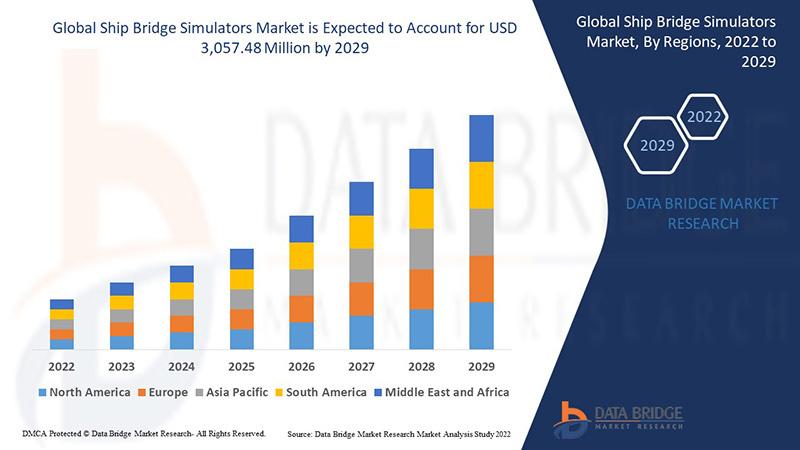"What’s Fueling Executive Summary Ship Bridge Simulators Market Size and Share Growth
CAGR Value
Data Bridge Market Research analyses that the global ship bridge simulators market is expected to reach a value of USD 3,057.48 million by 2029, at a CAGR of 6.7% during the forecast period
An influential Ship Bridge Simulators Market document supports in achieving a sustainable growth in the market, by providing a well-versed, specific and most relevant product and market information. This report provides details about historic data, present market trends, future product environment, Market strategies, technological innovation, upcoming technologies, emerging trends or opportunities, and the technical progress in the related industry. Ship Bridge Simulators Market report also takes into account strategic profiling of the major players in the market, all-inclusive analysis of their basic competencies, and hence keeps competitive landscape of the market in front of the client.
The steadfast Ship Bridge Simulators Market research report underlines an insightful overview of product specification, technology, applications, product type and production analysis considering major factors such as revenue, cost, and gross margin. The report is a useful resource which provides present as well as upcoming technical and financial details of the industry to 2030. The market drivers and restraints have been examined using SWOT analysis. To provide clients with the best in the industry, a team of experts, skilled analysts, dynamic forecasters and knowledgeable researchers work meticulously while preparing Ship Bridge Simulators Market business report.
Navigate the evolving landscape of the Ship Bridge Simulators Market with our full analysis. Get your report:
https://www.databridgemarketresearch.com/reports/global-ship-bridge-simulators-market
Ship Bridge Simulators Market Outlook & Forecast
Segments
- Based on type, the global ship bridge simulators market can be segmented into full mission simulators, multi-purpose simulators, and others. Full mission simulators provide a realistic simulation environment that mimics the actual bridge of a ship, offering a comprehensive training experience. Multi-purpose simulators are versatile and can be used for various training scenarios, while other types of simulators cater to specific functionalities or requirements.
- On the basis of application, the market can be categorized into military applications and commercial applications. Military applications involve training naval personnel in ship handling, navigation, and tactical operations, enhancing their skills and preparedness. Commercial applications include training for merchant navy crews, port authorities, and maritime training institutes.
- By end user, the market can be divided into naval organizations, maritime training institutes, and others. Naval organizations utilize ship bridge simulators for training naval personnel and conducting virtual exercises. Maritime training institutes incorporate simulators into their curriculum to provide hands-on experience to students, while other end users may include port authorities or shipping companies looking to enhance the skills of their staff.
Market Players
- Some of the key players in the global ship bridge simulators market include Kongsberg Gruppen, Aboa Mare, FORCE Technology, Transas (Wärtsilä), VSTEP, Image Soft Maritime Simulators, NAUTIS, ShipModul, FORCE Technology, and Remata. These companies are focused on developing advanced simulation technologies, enhancing the realism of their simulators, and incorporating innovative features to improve training outcomes for users.
- Market players are also investing in research and development activities to introduce new products and solutions that address the evolving needs of the maritime industry. Collaborations with maritime training institutes, naval organizations, and other stakeholders help these companies understand market requirements better and deliver tailored solutions that meet specific training objectives.
The global ship bridge simulators market is witnessing steady growth due to the increasing emphasis on training and skill development in the maritime sector. The adoption of advanced simulation technologies is enhancing training outcomes and improving safety standards in ship operations. As technology continues to evolve, market players are expected to introduce more sophisticated simulators that offer realistic scenarios and immersive training experiences for users.
The global ship bridge simulators market is poised for further expansion and innovation as technological advancements continue to reshape the maritime industry's training landscape. One emerging trend is the integration of virtual reality (VR) and augmented reality (AR) technologies into ship bridge simulators, enabling a more immersive and interactive training experience for users. By leveraging VR and AR capabilities, simulators can replicate real-world scenarios with enhanced visualizations, enhancing the overall training effectiveness and engagement levels of trainees.
Moreover, the market is also witnessing a shift towards cloud-based simulation solutions, allowing for remote access, centralized data management, and collaborative training sessions. Cloud-based simulators enable seamless scalability, reduced infrastructure costs, and enhanced accessibility for users across different locations. This trend aligns with the increasing preference for flexible and cost-effective training solutions in the maritime sector, driving the adoption of cloud-based simulation platforms.
Another key development in the market is the emphasis on customized and scenario-based training programs tailored to specific user requirements. Ship bridge simulators are increasingly being customized to replicate unique vessel types, navigational challenges, and operational environments, offering a more targeted and comprehensive training experience. By catering to individual training needs, market players can differentiate their offerings and provide value-added solutions that enhance user proficiency and operational readiness.
Furthermore, the integration of artificial intelligence (AI) and machine learning algorithms in ship bridge simulators is shaping the future of training methodologies in the maritime industry. AI-powered simulators can analyze user performance, provide real-time feedback, and adapt training scenarios dynamically based on trainee behavior, enabling personalized and adaptive learning experiences. This technology-driven approach enhances training efficiency, accelerates skill development, and ensures continuous improvement in maritime safety standards.
Overall, the global ship bridge simulators market is evolving rapidly to meet the escalating demand for advanced training solutions in the maritime sector. With a focus on innovation, collaboration, and user-centric design, market players are poised to redefine the training landscape and drive sustainable growth in the industry. By embracing emerging technologies, customization trends, and data-driven insights, the market is set to experience transformative changes that elevate training standards, enhance operational capabilities, and shape the future of maritime education and skill development.The global ship bridge simulators market exhibits a promising trajectory driven by the increasing focus on training and skill development within the maritime sector. One of the key factors propelling market growth is the rising adoption of advanced simulation technologies, which play a crucial role in enhancing training outcomes and elevating safety standards in ship operations. These simulators offer a realistic training environment that replicates actual ship bridges, providing users with a comprehensive learning experience.
Market players in the ship bridge simulators industry are actively engaged in developing cutting-edge simulation technologies to enhance the realism and effectiveness of their products. Companies such as Kongsberg Gruppen, Aboa Mare, and Transas (Wärtsilä) are at the forefront of innovation, continuously striving to incorporate new features and functionalities into their simulators. Collaborations with maritime training institutes, naval organizations, and other stakeholders further enable these companies to tailor their solutions to meet the specific training requirements of the industry.
A notable trend shaping the market landscape is the integration of virtual reality (VR) and augmented reality (AR) technologies into ship bridge simulators. By leveraging VR and AR capabilities, simulators can offer a more immersive and interactive training experience, thereby enhancing user engagement and learning outcomes. Additionally, the adoption of cloud-based simulation solutions is gaining traction, enabling remote access, centralized data management, and collaborative training sessions while ensuring scalability and cost-effectiveness.
Customization and scenario-based training programs are also emerging as significant growth drivers in the ship bridge simulators market. Companies are increasingly customizing simulators to replicate unique vessel types, navigational challenges, and operational environments, providing users with targeted training experiences that enhance proficiency and operational readiness. Moreover, the integration of artificial intelligence (AI) and machine learning algorithms in simulators is revolutionizing training methodologies by enabling personalized, adaptive learning experiences that improve training efficiency and accelerate skill development.
Overall, the global ship bridge simulators market is characterized by rapid evolution and innovation, driven by a strong emphasis on technology advancements, collaboration, and user-centric design. With a focus on transforming the training landscape, market players are expected to play a pivotal role in shaping the future of maritime education and skill development. By embracing emerging trends, customization strategies, and data-driven insights, the market is poised to witness significant growth opportunities and drive sustainable advancements in training standards and operational capabilities within the maritime industry.
Inspect the market share figures by company
https://www.databridgemarketresearch.com/reports/global-ship-bridge-simulators-market/companies
Ship Bridge Simulators Market Research Questions: Country, Growth, and Competitor Insights
- What is the full scope of the Ship Bridge Simulators Market valuation?
- What is the average growth rate expected post-2025?
- What segmentation variables are most impactful?
- Which firms lead in sustainability within the Ship Bridge Simulators Market?
- What product categories are showing exponential growth?
- Which countries are expanding their consumer base?
- What is the most rapidly developing regional economy?
- Which nations have the highest investment inflow?
- What region is setting pricing benchmarks?
- What are the innovation challenges facing this Ship Bridge Simulators Market industry?
Browse More Reports:
Global Folding Bicycle Market
Global Hyaluronic Acid Dermal Filler Market
Global Lithium-Ion Battery Recycling Market
Global Monoethylene Glycol Market
Global Packaged Soy Chunks Market
Global Paper Cup Market
Global Periodontal Disease Treatment Market
Global Preventative Healthcare Technologies and Services Market
Global Sauces, Dressings and Condiments Market
Global Travel Retail Market
Global Whey Protein Concentrates Market
Global Ceramic Tableware Market
Global Electric Toothbrush Market
Europe Healthcare Information Technology (IT) Market
Middle East and Africa Lithium-Ion Battery Recycling Market
About Data Bridge Market Research:
An absolute way to forecast what the future holds is to comprehend the trend today!
Data Bridge Market Research set forth itself as an unconventional and neoteric market research and consulting firm with an unparalleled level of resilience and integrated approaches. We are determined to unearth the best market opportunities and foster efficient information for your business to thrive in the market. Data Bridge endeavors to provide appropriate solutions to the complex business challenges and initiates an effortless decision-making process. Data Bridge is an aftermath of sheer wisdom and experience which was formulated and framed in the year 2015 in Pune.
Contact Us:
Data Bridge Market Research
US: +1 614 591 3140
UK: +44 845 154 9652
APAC : +653 1251 975
Email:- corporatesales@databridgemarketresearch.com
"



